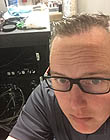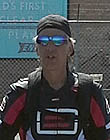|
|
 
|
|
Author
|
Topic: o scope
|
|
|
|
|
|
|
|
|
|
|
|
|
Randy Stankey
Film God

Posts: 6539
From: Erie, Pennsylvania
Registered: Jun 99
|
 posted 05-19-2010 01:08 AM
posted 05-19-2010 01:08 AM




I don't know if you know this. This is why I'm asking...
The first thing you need to know is the theory on how the system works before you even make the attempt at adjusting your projector, regardless of whether your tech trains you or not. After that, you need to understand what an oscilloscope does and how to operate it.
If you don't know how the oscilloscope works, you won't understand what it's trying to tell you. If you don't know how your sound system works, the information the scope tells you will be useless.
You don't need to know every little theoretical detail of how things work. You just need to understand the paradigms behind their operation. You need to know that the sound reproducer operates on a beam of light which passes through the soundtrack of the film then falls upon a solar cell or an electronic sensor which changes the modulated light beam into a fluctuating voltage. You need to know that a scope is basically a graph drawing machine where the Y-axis shows voltage and the X-axis shows the passage of time.
You don't need to know the theoretical physics which allow solar cells (or electronic sensors) to change light into electricity. You don't need to know the details of electronics behind the operation of the oscilloscope. But, if you don't know these basics, all the instruction in the world won't help you understand what you are doing well enough to do the job correctly.
Of course, you can be taught to "turn this knob" or to "adjust this screw" until the oscilloscope displays a pattern that looks a certain way but what will happen if you encounter a situation that you haven't been taught?
I'm sorry if I sound pedantic but I don't know your level of knowledge. It would be silly for me or anybody else to try to explain things to you unless we are able to speak on the same terms.
The first thing I'd say to do is what the others mention. Talk to your tech. Have him show you the ropes. If you can follow along with what he tells you, the learning process will not be too hard. But, if you watch him work and it looks like black magic, you know you've got some studying to do before you try this on your own.
Also, download the manuals from this site and read them. A lot of the things in there will seem like gobbledygook at first but you should eventually understand. When your tech comes, hopefully, you'll be able to understand what he's talking about and you'll be able to have an intelligent discussion once you know the terms.
| IP: Logged
|
|
Jenny Sparks
Film Handler
Posts: 5
From: cedar bluff va
Registered: Sep 2009
|
 posted 05-19-2010 08:23 AM
posted 05-19-2010 08:23 AM




OK,,heres where Im at
we have component engineering LED readers. I understand there is a method to set these up ...I have test film and how I did it before was...I have a plug in boards on the ultra 295 that has a noise reduction and has (I guess) level meters with needles,,,,I made me a set of headphones and went to work.....I adjusted the reader angle and distance by watching the needles and then listening to the sound from the test film....the sound (believe it or not) is actually pretty good....BUT OCCASIONALLY,,we will get a film in that for some reason or another, the surround dont seem to work,,,,I was told what was probably happening is that it wasnt reading it off the film and the the only way to really adjust these things is find a Oscope and go to work....I can get a cheap one off of ebay that the tech at Component Engineering said would be sufficient but dont have a clue what to hook up to,,,,Im assuming Im looking for a certain wave lenght or output signal,,,,,thought there may be some material that would show what Im looking for without harrassing the guys at component to death
In our area, there isnt any tech available (that I can afford) and the only one that has been on our property in the last 10 years was the first guy that was supposed to install all our stuff......he did one and THANK GOD, I was paying attention.....he set one of our 4 up and then got a phone call and left....never seen him again and he had the nerve to send me a bill.....nearest tech for me is about 6 hrs away that I have found and they charge 12 hrs traveling time.....So I installed the other 3 theaters myself,,,including screens,,projectors,,sound seats....everything.....learning experience....
when the new readers became manditory a few years back, I bought them and set up in a day or so and the above mentioned was how I did it,,,,the sound is good but I know it can be better.....we have ultra 295s..dual EV amps with main centers and side surround
I dont want to dump alot of money into this if possible at this point,,,,we are going to have to go to digital if we are to stay in business so we are saving for our spending spree there..LOL
any help is appreciated
thanks
| IP: Logged
|
|
|
|
|
|
Sean McKinnon
Phenomenal Film Handler

Posts: 1712
From: Peabody Massachusetts
Registered: Sep 2000
|
 posted 05-19-2010 01:02 PM
posted 05-19-2010 01:02 PM





I sympathise with your situation. It is difficult when you cannot find the help you need at a reasonable price. have you tried Strong Technical Service? they have techs all over the country and can set you up with a service contract where you will get 3 routine service calls a year that include not only the a chain alignment you need but a full mechanical check-up and tweaking, bulb focus and alignment, platter timing, lens alignment etc... and included emergency service. They charge reasonable rates by the month which depend upon a few fac tors how many screens, how many locations, how far away you are from thier tech's "base" (house) but it can be as low $50.00 a screen per month. They may also be willing to send someone out to come and check things out for you and give you an estimate on a service contract. I havent worked for them in a while but there number was 800-722-4445 and you want to ask for Bud Shepard please let him know that I refered you. I don't remember if they have anyone in Virginia or not but I would bet if anyone does it would be them. Calling them cannot hurt and having someone come out to check things out and give you a quote on a contract cannot hurt. Having the included emergency service can pay for the whole contract for the year with just one or two calls in some cases.
As I said before the dolby manuals are a really great reference for how to do an a-chain alignment. Most even have pictures of what you want to see on the scope. However, like Randy said if you do not have a comprehension of what you are seeing it does little good. Also like Tony said it is possible to damage equipment with the improper use of test equipment. I have seen circuits shorted with a multimeter probe, It is also possible to damage the test equipment. Hooking a meter to a rectifier without properly disconnecting the igniter is a good way to lose the meter. And as Tony said you can really make things catastrophically worse by trying to improve things if you do not have the proper training. Demetris also pointed out that without a proper thorough a-chain alignment you are missing some key adjustments such as frequency response (focus and azimuth), cross talk, lateral alignment, signal level.
| IP: Logged
|
|
|
|
|
|
|
|
All times are Central (GMT -6:00)
|
|
Powered by Infopop Corporation
UBB.classicTM
6.3.1.2
The Film-Tech Forums are designed for various members related to the cinema industry to express their opinions, viewpoints and testimonials on various products, services and events based upon speculation, personal knowledge and factual information through use, therefore all views represented here allow no liability upon the publishers of this web site and the owners of said views assume no liability for any ill will resulting from these postings. The posts made here are for educational as well as entertainment purposes and as such anyone viewing this portion of the website must accept these views as statements of the author of that opinion
and agrees to release the authors from any and all liability.
|

 Home
Home
 Products
Products
 Store
Store
 Forum
Forum
 Warehouse
Warehouse
 Contact Us
Contact Us




 Printer-friendly view of this topic
Printer-friendly view of this topic








![[Big Grin]](biggrin.gif)







